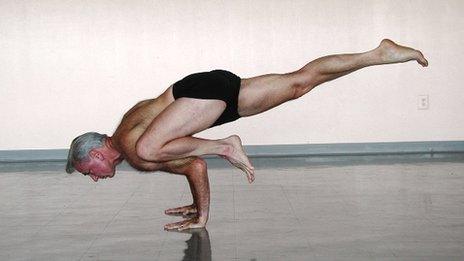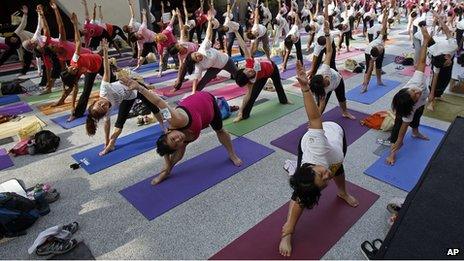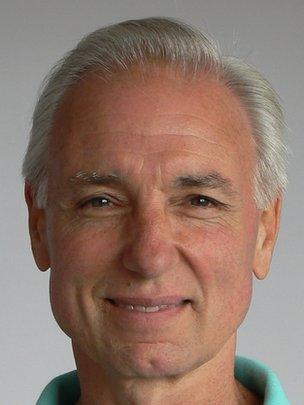The yoga boss who won't change his methods to get more customers
- Published

John Schumacher's classes don't do quick moves, but difficult ones do feature
John Schumacher is one of the calmest bosses you could ever meet, and almost certainly among the most flexible.
One of the best-known yoga teachers in the US, at the age of 68 he is still supple and strong enough to perform joint-defying back bends, and hold poses that would make most people's eyes water.
So it is somewhat disappointing that when you meet him he is wearing a plaid shirt and jeans, and sitting comfortably in a chair with his ankles crossed in front of him instead of tucked behind his head.
"You can describe me as normal," he chuckles. "It's your perception. Write whatever you like."
That casual self-confidence, coupled with a take-it-or-leave-it attitude, has helped Mr Schumacher build his company - Unity Woods - into a chain of yoga studios across the Washington DC metro region.
The approach has served him well so far, but will it prove unsustainable as consumer culture continues to change?
'Victim of my own success'
Yoga is now a $5bn (£3bn) industry in the US - a far cry from the basement classes that Mr Schumacher taught in people's homes when he started his career in the 1970s.
"One of the challenges at the moment is to find out how I can teach with integrity, present valuable and meaningful yoga, and still stay viable in a culture which now sees yoga as a commodity," he says.
In other words, how can he market an activity - which he believes requires time and commitment - to an on-demand generation that expects choice and instant gratification?
"People want convenience now," he says. "They don't want to make a commitment - and I still insist on that."
So while a growing number of yoga studios now offer pay-on-the-day drop-in classes, Mr Schumacher asks that his students commit to three-month courses to help them develop a relationship with their teacher and see steady progress over time.

Yoga has soared in popularity around the world in recent years
Newbies can drop-in on a session to try it out, and additional single classes are offered to existing students.
"But people realise they are not getting the full benefit of what's possible," he says. "References are made to previous teaching that they don't know anything about."
Yet while it means that Mr Schumacher's students pay in advance, it does put off the more casual yoga enthusiasts - who have grown in number in recent years.
Add the big rise in the number of rival yoga centres, and Unity Woods has seen numbers fall over the past decade.
At the start of the millennium Unity Woods was teaching about 3,000 students a week at studios in Virginia, Maryland and Washington DC.
"I'm a victim of my own success," says Mr Schumacher. "There's a yoga centre on every corner now, and our student population has declined to around 1,200 or 1,300."
'Changed completely'
Fortunately, the boss of Unity Woods is used to bucking trends.
"My father had a successful plumbing and heating business, which I worked in during the summers as a kid and during my break from college," he says.

Mr Schumacher's business has had to make savings in recent years, but still has a healthy $1m turnover
"I knew I didn't want to do that. So I was a big disappointment to him when I turned into this hippy-yoga-hairy kind of musician person. He was born in 1897 and was from an immigrant Lutheran family, so it was a whole other world for him and we didn't connect."
Mr Schumacher's exploration of yoga started in his early 20s when he had "a minor epiphany" and decided to take more care of his physical health. "You can have everything you want but if you don't feel very good that's not going to matter much," he says.
Somebody gave him a book on yoga, and for a few years he practised the poses and absorbed some of its philosophy. There weren't many classes available then, but he learned what he could and began to teach others.
Then he was introduced to the teachings of the legendary yogi BKS Iyengar and travelled to India to study.
The experience was transformative, and he has returned many times since to become one of only 13 Americans to hold an advanced teaching certificate in Iyengar yoga - a slow form of yoga that promotes physical and spiritual well being.
It also gave him his first taste of customer dissatisfaction.
"My teaching changed completely because I had to teach what I was practising, and a lot of people did not like what I was doing," he says. "I lost about half of my students.
"But gradually people started to come and I wound up having more students because of it."
No loud music
But can Mr Schumacher's principles work in a cut-throat commercial environment? He believes they can.
And while Unity Woods has had to make savings in recent years, it still has annual revenues of more than $1m.
"Our students tend to be older because of the style of yoga that we teach," he says.
"It's a little slower, we're not playing loud music, we're not jumping in and out of poses, we're not turning the room up to 105 degrees, and we're not doing a lot of stuff that's very popular now and that younger people want to do."
Mr Schumacher adds that he is now increasing its promotional efforts, which means a better website and more online marketing. Although half of his business still comes via word of mouth.
"I personally will survive," he says. "I can always go back to teaching in people's basements.
"Can Unity Woods survive? I like to think so, but we have leases due on all three studios in spring of 2015 so I will have to make some decisions then about what I want it to be and what it can be at that stage of the game.
"But I have no intention of retiring. I love what I do."